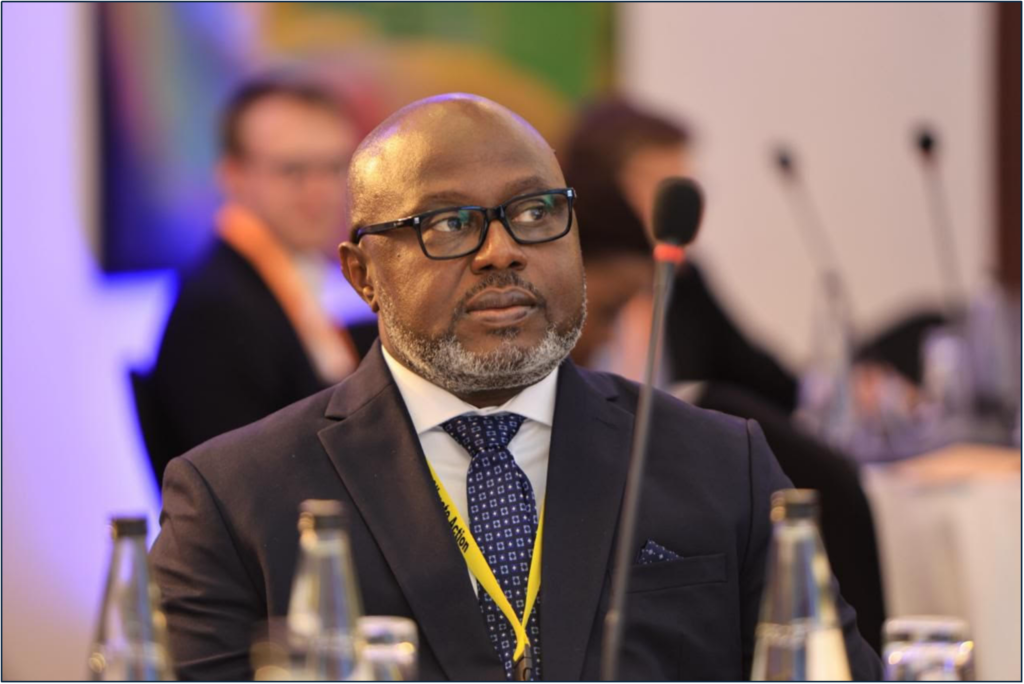The Deputy Minister of Finance II, Bockarie Kalokoh
The Deputy Minister of Finance II, Bockarie Kalokoh, led a delegation to Kampala, Uganda, to participate in the Sustainable Horizons: Climate Action Strategies for Ministries of Finance in Africa on 16-17 July 2024.
This meeting attracted Ministers of Finance, Planning and Economic Development, and institutional partners of the Coalition of Finance Ministers for Climate Action (CFMCA) to foster peer-to-peer learning and knowledge sharing on green economic growth, strategic National Planning for Adaptation, and the role of Finance Ministries in Nationally Determined Contributions (NDCs) due in 2025.
The event also aims to attract new members to the Coalition, while also exploring opportunities for further collaboration among African Ministries of Finance to drive climate action for sustainable growth.
During the event, Deputy Minister of Finance II, Bockarie Kalokoh, served as a panelist in a session on “The Unique Climate Opportunities and Challenges for African Ministers of Finance” and also chaired another session on “Strategizing for Adaptation, and Adaptation Planning Country Experiences”.
On both occasions, Bockarie Kalokoh highlighted challenges posed by climate change and their impacts, especially on African countries like Sierra Leone.
He informed his audience that climate change has resulted in disasters such as extremely high heat, flooding, earthquakes, wildfires, loss and damages, increase in health risks, among others, which he says have posed severe challenges to the economy, the environment, and even on the health of the population.
Deputy Minister, Kalokoh, further stated that these climate-related issues have resulted in economic vulnerabilities, an increase in government expenditure on climate actions, loss and damage to infrastructure, a fall in agricultural productivity and water scarcity, health risks and hazards, etc.
“The challenges of high debt burden are presenting a difficult situation for countries to invest in climate actions projects, tight fiscal space, political instability, low climate investment, stagnation and low climate foreign inflows, inadequate technologies, global inequality and injustice in addressing issues of GHG high emitters, vulnerability to climate impacts are all impeding our efforts to succeed in the fight against climate change” he added.
The Deputy Minister of Finance II also stated that despite the challenges posed by climate change, it also presents opportunities such as investment in renewable energy such as solar panels.
He further stated that the Government of Sierra Leone’s “Feed Salone” flagship program also makes way for increased government investment in agriculture, which covers investment in agricultural research, innovation, and extension systems to promote climate-smart agriculture and agricultural technologies for producing a high-yield variety of seeds to boost resilience against climate change, water resources management, biodiversity conservation among others.
He also highlighted some of the adaptation actions undertaken by the government of Sierra Leone like tree planting project through the Green Public Works (GPWs) program implemented by NaCSA in partnership with city councils, As a nation, formation of international alliances as well as formulation and implementation of domestic policies, strategies, and frameworks are key.
He reiterated the government’s commitment to fighting climate change, stating that Sierra Leone serves as a member country in several international coalitions, including the coalition of Finance Minister for Climate Action, which works with international and multilateral organizations such as the World Bank, IMF, UNDP, the private sector and other domestic organizations to combat the impacts of climate change.
He ended by urging development partners to increase the release of funds to developing countries to finance their NDCs and NAPs if they are to achieve their set climate targets and the international set targets.
Another member of the delegation, Emmanuel Tamba Gbondo, as part of a panel discussion on “Sustainable Budgeting for Integrating Development and Environmental Objectives, and Sustainable Budgeting Country Experiences” highlighted government priorities in supporting environmental safety projects and the establishment of the Presidential Initiative for Climate Change, Renewable Energy and Food Security to initiate supports in smart climate investment and the climate finance unit at the Ministry of Finance.
